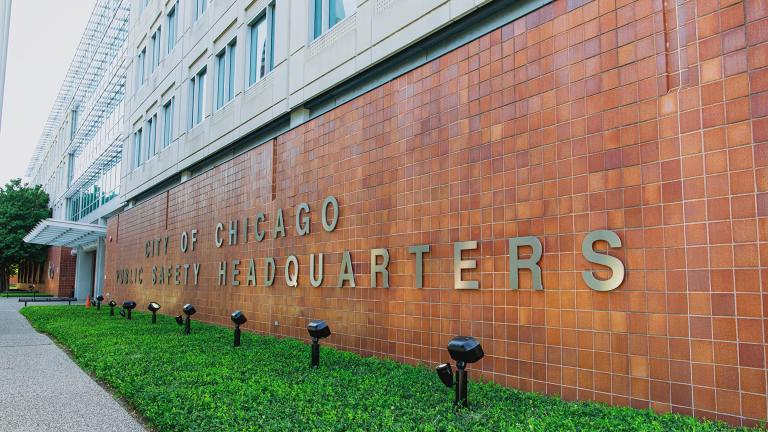Chicago’s next top cop must be “a dynamic change agent” fully committed to implementing the court order requiring the Chicago Police Department to change the way it trains, supervises and disciplines officers, according to a new report. Its recommendations have been embraced by a former Chicago Police Department official fired after warning the push was falling short.
Robert Boik, who served as executive director of the police department’s Office of Constitutional Policing and Reform, was fired by former Chicago Police Supt. David Brown in August 2022, days after Boik warned that Brown's decision to move 46 employees to patrol shifts would violate the court order requiring the department to reform itself, known as the consent decree.
Brown resigned earlier this month, just days after former Chicago Public Schools CEO Paul Vallas and Cook County Commissioner Brandon Johnson advanced to a runoff on April 4 in the race for Chicago mayor. Both said they would fire Brown. Chicago’s newly created Community Commission for Public Safety and Accountability now has until mid-July to send three superintendent finalists to the mayor for his consideration.
In an interview Wednesday on “Chicago Tonight,” Boik said the new report should serve as a road map for the city’s next top cop — and its next top executive.
“The truth of the matter is the essence of what is missing in Chicago, what has happened in (Los Angeles), what has happened in New York, is a real effort to build community relationships, build trust in the community,” Boik said. “That needs to be their primary objective.”
There are several good candidates to lead the department now on staff, Boik said. Both mayoral candidates — Vallas and Johnson — have said they would like to pick a current member of the department to run the beleaguered agency.
The consent decree was issued after a 2017 federal investigation found officers routinely violated the constitutional rights of Black and Latino Chicagoans. The city’s progress in implementing that 4-year-old court order has been anything but rapid, with the city in full compliance with just 3% of its requirements, according to data released by the Chicago Police Department.
Boik said the report released Wednesday by 21CP Solutions, a group made up of former police chiefs and public safety experts, including former Los Angeles Police Chief Charlie Beck, who briefly served as Chicago’s interim top cop, laid out a path forward for the Chicago Police Department.
Boik, who was a member of the Chicago Police Department for six years, is now an independent consultant.
That report offers a five-point plan to address what the report’s authors call the “the most serious crisis in a generation” facing police departments fueled by “a collapse of public trust,” a sharp decline in the number of police officers and rising crime fueled by the COVID-19 pandemic and its aftermath.
The most important part of addressing that crisis is to ensure that police departments are led by “authentic and transparent” chiefs, according to the report.
“It is important for a police leader, supported by city leaders, to set out a broad, optimistic, easily understood vision for the future of their department and community safety in their jurisdiction, to reassure communities and police members alike,” the report said.
The report also calls for members of the public to shift their view of what it means to be an officer.
“Most people do not understand what the policing profession actually entails,” according to the report. “Most of the time it is not crime fighting or law enforcement and the profession does itself no favors by using such terms. The great majority of a typical police officer’s time is spent helping people who are at risk or in behavioral crisis.”
The report also calls for police departments to emphasize community policing and strive to keep the same officers assigned to the same neighborhoods to build trust and collaboration.
“Neighborhood policing should be the lifeblood of the police organization,” according to the report.
To make that possible, the report urges department leadership to deploy officers to regular patrols, not so-called saturation teams, which have been linked to multiple scandals in multiple cities, including the beating death of Tyre Nichols while in the custody of Memphis police.
“‘Saturation teams’ that respond to and focus on high-crime neighborhoods have produced questionable results,” the report said. “The value of such operations should be carefully weighed against risks.”
The report also calls for the new superintendent to order a study to determine where and when officers should be deployed. A similar study ordered by Brown concluded that the department was not assigning officers to work when and where most violent crimes were taking place at night on the South and West sides.
Any effort to move police resources from wealthy areas of the city could trigger an outcry from members of the Chicago City Council and residents of the North Side and downtown.
“Politics should play no part in this process,” the report said. “Police numbers are limited and must be deployed for maximum effect where they are needed most.”
Officers should also be required to declare which clubs, societies and other groups they belong to and confirm they do not belong to hate and extremist groups, including the Oath Keepers and the Proud Boys, according to the report.
Police leaders told the City Council on Feb. 22 they were working to craft a new policy that would expand the types of “criminal” organizations that officers are prohibited from belonging to or associating with, including those that are the “antithesis of the Chicago Police Department.”
Contact Heather Cherone: @HeatherCherone | (773) 569-1863 | [email protected]








